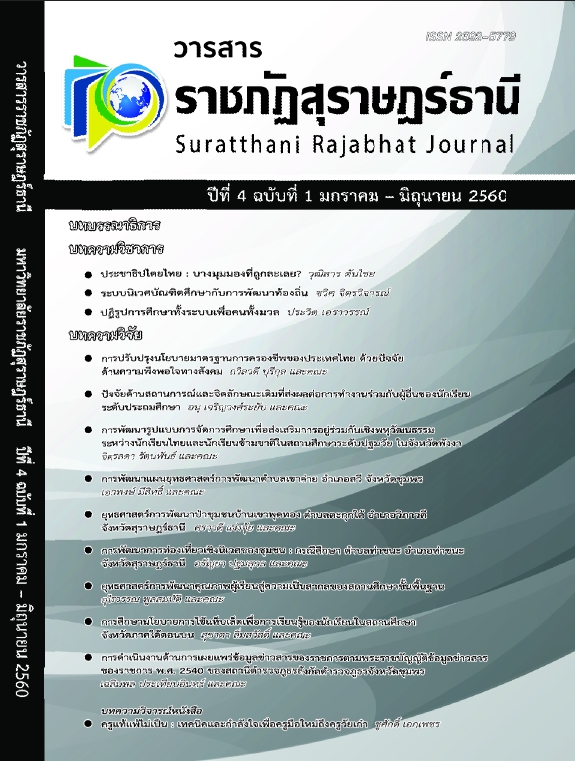Ecology System of Graduate Studies for Local and Communities Development
Main Article Content
Abstract
This article aims to describe universities mission in graduate studies and social engaged scholarship and describe relationships of the elements ecology system of graduate studies for local and communities’ development. The pillars mission of universities management in graduate studies involved teaching, research, academic service and cultural conservation. The quality of graduate studies management based on graduate studies standardization and internal quality assessment in curriculum, faculty and universities level. The linked of graduate studies and local community depended on universities philosophy. For example, the philosophy of Rajabhat Universities was “Universities for Local and Community Development”. The National Research Universities and Government Universities have “Social Engagement” mission to construct body of knowledge, learning process and integrate for research utilization to implement both of universities and communities by “Social Engaged Scholarship” paradigm.
The ecology system of graduate studies for local and communities development integrated structure of policy and universities mission, university social engagement, graduate studies curriculum and pedagogy, educational standardization and curriculum quality assurance, research, thesis and individual study, academic service and local communities. These were integrated knowledge, technology and innovation transferred from universities to local community. The implementation ecology system of graduate studies for local and communities development in graduate studies curriculum and pedagogy were to utilize of monodiscipline, multidiscipline, crossdiscipline, interdiscipline, transdiscipline curriculum and pedagogy for local entrepreneur and human resource development in the local communities. The implementation ecology system of graduate studies for local and communities development in research, thesis and individual study were to construct knowledge and innovation based on “Area Based Research” to solve local and communities problems. These were based on knowledge transfers, research utilization and academic service in local and communities’ development and mutually beneficial relationships of graduate studies student, teacher, universities and local community for self-reliance and sustainable development.
Article Details
References
ปิยะวัติ บุญ-หลง. (2553). นโยบายบัณฑิตศึกษาเพื่อรับใช้สังคม. รายงานการประชุม นโยบายวิจัยบัณฑิตศึกษาเพื่อรับใช้ชุมชนท้องถิ่น ณ ห้องประชุมพระยาศรีวิสารวาจา มหาวิทยาลัยเชียงใหม่ วันที่ 5 พฤษภาคม 2553.
รัตนะ บัวสนธิ์. (2558). การวิจัยแบบไร้กำแพงทางวิชาการ. อัดสำเนา. เอกสารประกอบการบรรยายการประชุมวิชาการระดับชาติและนานาชาติ ประจำปี 2558 มหาวิทยาลัยราชภัฏนครราชสีมา วันที่ 25 ตุลาคม 2558.
สำนักงานกองทุนสนับสนุนการวิจัย. (2559). ABC : การวิจัยรูปแบบใหม่เพื่อสร้างการเปลี่ยนแปลงในพื้นที่ (Online) สืบค้นได้จาก : http://abc.trf.or.th/ index.php/home/aboutus (2559, 30 พฤษภาคม).
สำนักงานคณะกรรมการการอุดมศึกษา (2554). ประเด็นปฏิรูปอุดมศึกษารอบสอง เล่ม 1. กรุงเทพฯ : โรงพิมพ์จุฬาลงกรณ์มหาวิทยาลัย.
สำนักงานคณะกรรมการการอุดมศึกษา. (2558). ระบบสารสนเทศอุดมศึกษา ปีการศึกษา 2558 (Online) สืบค้นได้จาก : http://www.info.mua.go.th/ information/index.php (2559, 28 พฤษภาคม).
สำนักมาตรฐานและประเมินผลอุดมศึกษา. (2558). คู่มือการประกันคุณภาพการศึกษาภายในระดับอุดมศึกษา ฉบับปีการศึกษา 2557. กรุงเทพฯ : สำนักงานคณะกรรมการการอุดมศึกษา.
อาวรณ์ โอภาสพัฒนกิจ. (2557). ระบบนิเวศวิชาการรับใช้สังคมไทย ... Innovation Platform ... ในช่วงยุคทองของนักวิชาการ. วารสารวิจัยเพื่อพัฒนาพื้นที่ 6(6), กรกฎาคม - สิงหาคม.
เอกชัย แสงอินทร์. (2558). อภิธานศัพท์. เอกสารอัดสำเนา. บัณฑิตวิทยาลัย มหาวิทยาลัยเชียงใหม่.


